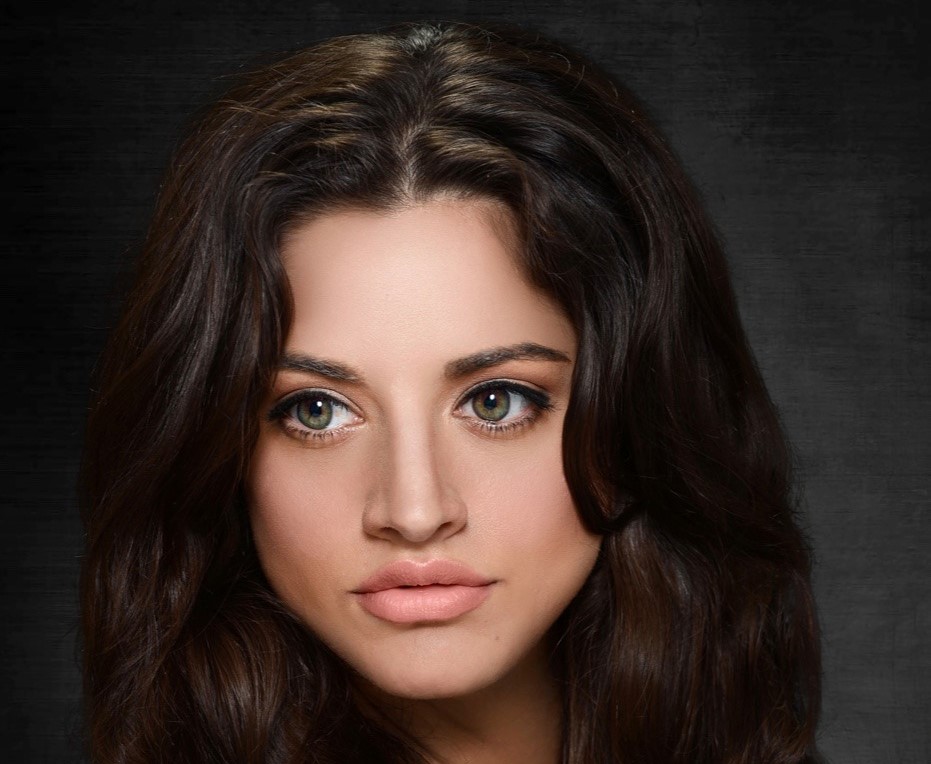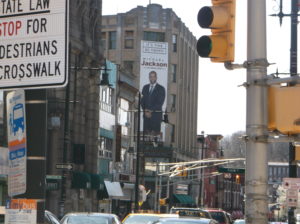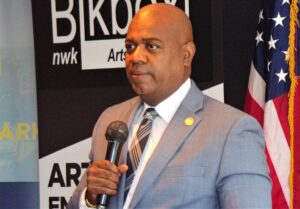The Poet Laureate of Paterson and the Politics of Grace

PATERSON - Elizabeth Estella, the delicate, sensitive, but Paterson-tough poet laureate of this craggy North Jersey factory town, has inspired a worldwide Facebook following with her artful and always poetic posts about life, language, love and the crisis of her cancer diagnosis. Already a veteran of two massive cancer surgeries, and pneumonia four times in two months, she now faces - already scheduled and postponed - the mother of all surgeries (14 hours), which requires the removal of all nonessential organs and chemotherapy by hand. As a consequence of melted together scar tissue in her body, she can't eat, but speaks in a voice of strength and determination.
At this juncture of her own courageous journey, within a political atmosphere fractured and fragmented by partisan sloganeering, ugliness, narcissism and ad hominem attacks as a substitute for dialogue, Estella, or "Lizzie" as she is known to family and friends, wants to transmit a certain grace, humanity, and adoration of beauty.
"Poetry has seen me through a lot of it," she told InsiderNJ on the porch of her Paterson home on the East side of the city. "I am not averse to social media, but I'm not particularly socially media savvy. I suppose what I do is a kind of cross-genre prose, and it amasses responses from people all over the world. I'm shocked by it. People will mail me things. I received a rosary, a pressed flower. I think at a time when things are very divisive in American history, and so broken, I think I am in this unique position of only seeing the best in people. When you have cancer, people are so gorgeous to you. Politics are aside. ...I want the regular mundane gossip too but obviously people try to keep it away from me because of my condition. Clearly, finally my message is for hope. I don't have space for anything else in my being other than hope. People respond to hope. They write a little thing on my page and it means the absolute world to me. I'm also surprised by how poetical people are, in a natural and generous way. They let themselves be poetic on my page, and it pushes back against the idea that poetry is esoteric."
Can poetry be defined as language in its most essential parts? And how much of Estella's poetry is the condition she is in now versus the nature of a poetic being?
"I suppose poetry just occurred," she said. "There is no other way for me. I was a poet long before I was sick. I'm never not a poet. That's the way I see the world. Everything is fodder for poetry. It's frustrating to be my partner because just walking down the street is not a simple task. I love finding loose pieces of paper. I will read the whole grocery list whereas my partner is not always in the mood sometimes you just want to pick up some milk. I didn't realize the posts would spiral into something. It's become a journal for me. It's hard to inform the people about the updates in my life. I've outlived my prognosis. Maybe now it's about leaving it behind. People will read them when I'm gone, and so I want to leave a record poetically. I want to get the words as right as I can. There's a tenderness there because it's a tender subject. Death is there. We all know I'm sick. How do we make that beautiful?"
Born to an Iranian father and American mother, Estella grew up in Hillsdale, the adopted daughter of a Russian Jewish mom and Cuban dad. In part a quest for identity amid supposedly irreconcilable worlds led her to poetry, which she studied at Columbia University (BA) and then at the University of New York (MFA). She taught creative writing and poetry at her alma mater, NYU, and at Passaic County Community College, and moved to Paterson with her beloved daughter and spouse, Damen, a native Patersonian and the owner of the Underdog Bar and Grill.

Paterson, with its cauldron of overlapping and intersecting identities, a boiling point of humanity, gave her sustenance, and reinforced her poetry.
"People are angry and rightfully so, and a lot of the poetry we're seeing now is a direct response to what's going on in the world," she said. "I'm not that poet. I've thought about it and part of me feels guilty that I don't go into larger, important topics, especially as a first generation Iranian American, but I don't delve into identity politics. Poetry is narcissistic, myself included. I constantly fight against that. I don't want to be that person with words on paper insisting that what I have to say is important."
Sometimes, or much of the time, this poet drawn to the work of William Carlos Williams and Allen Ginsberg, says poetry is about a flower, or a tree, or a waterfall.
"Being the poet laureate is a political designation," she concedes. "There are a lot of politics involved, and as much as I like to shun politics, I'm deeply embedded in it. I've pulled away from it the last couple of years just to get my priorities in order, and to stop worrying about things I try to fix in Paterson. There are so many things that need fixing. My family was getting tired of it. What I observed is that everybody wants to reinvent the wheel. The attitude is 'I'm going to do a backpack drive,' and then causes someone to say, 'I'm going to do a backpack drive.' If they came together it would be so much more effective. I found it was easier to help one person at a time rather than through organizations, which waste a lot of time through the political infrastructure. I found it amounted to a lot of photo opportunities without much really getting done. I've tried to help people on an individual basis by connecting them to one another on my page. It's a really weird mix of people, from the actual poet laureate [of the United States] to someone who won the Nobel Prize, followed by someone I may have helped get sanitary products from when I did a poetry workshop with teenage girls. Writing something for a political event is very challenging. It needs to touch everybody, including the people who didn't vote for this guy, [in the case of Mayor Andre Sayegh, whose first swearing-in ceremony included a poem by Estella], hope, and patriotism. It's hard for me because I'm a love poet. So I approached the inaugural poem that way, as a love poem to Paterson."

Part of her work - perhaps political by definition - includes her efforts to ensure the continuing recognition of Williams and Ginsberg in the same city that inspired those late poets. When she found out that a reworked mural by the Great Falls omitted a quote by Williams, she intervened. "I was livid that they were taking down Williams and putting up an anonymous colloquialism," she said. This, after all, was the poet who wrote Paterson, an epic poem about the city in which he worked.
"I made about 18,000 phone calls, and I tracked down Dave Thompson and now the mural has a quote by Ginsberg, 'The weight of the world is love.' So many people stand in front of that mural and take pictures. I think it's appropriate. We have all these street names with council people from 20 years ago. We should have a quote that honors Allen Ginsberg, who grew up here and went to Eastside High School. Part of what I want to contribute is I want to make the city proud following the legacy of Williams, Ginsberg and Maria Mazziotti Gillian."
Silk City is her adopted hometown, and the one she needs.
"I never felt home until I moved here," said the Paterson Poet Laureate. "My neighbors have such incredible grit. You look at this city, at places like the Art Factory and the Courthouse and how beautiful things were and how beautiful they could be, if only. In the suburbs I felt very stifled. I remember going to Starbucks and seeing 12-year-old kids ordering complicated coffee beverages while being unsupervised, while not looking the baristas in the eye. I thought, is this going to be my life; this sense of entitlement without any art? There's not enough pain. I'm not saying there's no pain in the suburbs, obviously. But here you can see the urban decay and that is great as a poet. We have the river. We have the waterfall. The people have these beautiful stories because they have experienced so many hardships. I love to talk to older people about what Paterson was like in the 50's and 60's. And remember, we were nearly the nation's capital. Think abut [Alexander] Hamilton's role in that; there's so much history here, and it did aggravate me that in [the Broadway show] Hamilton, where was Paterson?"
Estella's other forays into politics have been painful, or at least instructional.
As a poet, she considers herself fragile by nature. On an occasion in 2018 when she asked a question of a political candidate expressly to make him look bad and benefit someone else, she felt guilty. It didn't give her a good feeling about Paterson politics. "It's very Hamlet-like, the backstabbing. But yes, I did, I asked [Councilman Mike Jackson] who the vice president was and he didn't know, and it went viral and I didn't feel good about it because if you go into something with the goal of humiliating someone, that's not good. I hate hurting people. I hate it. I'm a poet. I didn't know how to fix it. That's when I realized I can't be a politician."
She ended up personally apologizing to Jackson, who accepted, and said he would pray for her.
She's good friends with other politicians, among them Prospect Park Councilman Robert Artis. She also soulfully bonded with Newark Mayor Ras Baraka.
"Mayor Baraka found out through a friend that I'm sick, and he came here, right on this porch and had

tea with me one Sunday afternoon to cheer me up," Estella said. "He came here with no agenda, about a year and a half ago. I can't vote for him so there's no gain for him. Just poet to poet. He came here as a poet to soothe the soul of another poet in Paterson. I asked him about being a person in a position of power who is also a poet. Does he separate the two? He said, 'I'm a poet in everything I do.' His politics are through the lens of a poet. Maybe that's why such a good politician. He would read poetry at the COVID debriefings. He put out a spoken word video, which was just so gorgeous. When does he sleep? Newark is a good model for Paterson. Baraka? He has a presence about him. He is so great. Truly, there's a greatness to him. You feel he has a kind of magic to him; the poet shining through maybe. It's whatever that magic is that makes people poets. He's authentic."
Authenticity forms the core of poetry, Estella says.
"It could be about anything but only you could have written it," she explained. "I need that heartbeat. There's way too much narcissism and political pandering. When it becomes didactic or lacks that authentic voice, it loses me. Something needs to be at stake in this poem. right now, I write a lot about mice. My aesthetic is very whimsical. I combine things that are impossibly sad with whimsy. I'm also working on a series of poems, a pantheon that includes different celebrities, including one for [former heavyweight champion] Mike Tyson. I love him. He is so poetic. He said, 'it's a tough pillow to sleep on.' He has some great ones. He did record a little video for me, telling me to get better."
The fighting poet is understandably a boxing buff, and sponsored a reading for charity at a local gym. "Boxing and poetry," she said. "I did it at Ike and Randy's Boxing Gym. Poets read from the ring. All the money went to Ike and Randy's Foundation for Youth Boxing."
If she feels he correlative of boxing and poetry she also insists that we need poetry in our politics, to suppress and subdue the language of partisanship, rancor, and mean-spiritedness.
"It's personal, of course; if it's a poem to one person it's a poem," she said. "As human beings, we crave art."
She recommends contemporary poets Ada Limon, Ellen Bass, Ross Gay, Anne Carson, Frank Bidart, Richard Siken, and Wallace Ludel. She also loves E.E. Cummings, Pablo Neruda; and of course, Williams and Ginsberg (pictured, below).

"In our public life, yes, we have accepted a certain theater of cruelty; I'm very disillusioned by politics at large," the poet said. "The amount of times I see people who used to be allies turning around and viscerally hating, makes me not trust any of it. Nobody's safe. It's all manipulating one another. Politics turns decent people foul. Maybe that's why I resist it too. I don't have that kind of strength. I'm actually very fragile. People say, 'You're so strong.' I'm not at all. I'm a delicate fragile human being. For me to make someone feel less than beautiful would be horrible for me."
Part of what she fights for, maybe the core of it, is simply the condition of being human, and its depth, the antithesis of a simplified political designation, agenda, or prefabricated slogan. "Writing is a way of saying 'Do you see me? Do you hear me? I'm suffering. I love you. You're keeping me alive.' I like being able to say 'I had a good blood test.' My poetry is for the lovers. Hopefully, it perfumes people's lives with love. There are a lot of lonely people. I just love people and I am in this unique place of seeing beauty in them at at a time when things are frustrating politically and financially."
Did we accept anger as intrinsic to our art or to the life of politics, instead of the courage to understand and embody the art of kindness?
"There are moments of anger," Estella said. "I fought like hell in my last session of chemotherapy. It was hard. I lost my father. I lost my biological mother. I thought, 'What more are you going to throw at me? How much can one person take?' I do have moments where I crumble to the floor and am a puddle. But if you let the anger carry on for too long, you live there, and I am not making a home there. You always must make hope override anger. I want to have my sickness give people hope. It's so easy to be angry at cancer. We all agree it's the worst. There's no defending it. I have started making a list of belongings for Stella's high school graduation. I'm even planning my own funeral. It's scary. It's beautiful. I also have thoughts like, 'give my blue ring to my daughter for her wedding.' I can live in that sadness but it would rob me of today. Also, I could get hit by a bus tomorrow. Anything can happen on any given day. I am blessed in that I see it coming and can put it in words or find a place to put it. Being angry about it, that isn't it. I just want to be remembered for having grace.
"It's things we should all do as people anyway," she added. "Sometimes I just think of all the things most beautiful in the world, from A to Z. Anemone for A; B for bumblebee. I will always find Damen and Stella and along the way, take some stock of what we're grateful for. Please, just say a sincere prayer for me. If enough people put energy goodness into the world, certainly it can't hurt. Plan your funeral. It's going to happen. Say the things to people that you mean. 'I love you.' Don't hold it in. Say everything to people, except for the mean stuff. I don't focus on the fact that I can't eat. I like to imagine what I can eat on a perfect day. It's what I love about being a poet. You can create beauty when you need it. You can conjure it. I find so much in flowers. When you actually are dying, you have this unique perspective. There is no time to be angry and to wallow in the things that do matter. I have Chai tea. A beautiful house. An incredible marriage. I'm head over heels in love with Damen. Cancer has been so romantic for us. We slow danced when my balance was shot. He asked me every day to dance with him. Imagine if we did that when we're not sick. Ask your partner to dance. Never take food for granted.
"My goal is to leave things a little more beautiful than I found them."






I met lizzy at the twisted elm. I had the pleasure of working at the underdog. She captivated me at hello. Her smile and kind heart ❤️. She gave me a poetry book for Christmas I still carry. HOWL. She is a beautiful soul. A warrior at heart. Reading this made me tear up. May her legacy and all the art she did forever be a mark and inspiration to all. U are a true jem
Such an inspiring, miraculous story. You are so humanly transcendent, Lizzie. My thoughts and prayers are forever with you.
Beautiful as a person and as a poet. Your life graces the world. I love you.
Lizzie, is the most beautiful, inspiring gifted person anyone will ever have the honor of meeting .She don’t even know how much she has helped me and I’m absolutely sure many others.she has a beautiful soul. She is a gift from GOD???
Beautiful story of struggle and hope. However, isn’t Talena Lachelle Queen the present Poet Laureate of Paterson? Why isn’t she mentioned in this article?
The poet laureate of Paterson is Talena Lachelle Queen. While I applaud this lady's courageous cancer struggle, why isn't Queen being mentioned as Paterson's poet laureate?
Lizzie: I have never met you, but think of you as a friend, a daughter, the sweetest soul. I pray for you and think of you each day knowing you will find the beauty in even hours of despair. If each person could have you in their life, and the hope and kindness you bring, the world would truly be a better world. Even though fragile you have as much strength as Mike Tyson. Thank you for sharing yourself. We need you beautiful one.
Have been thinking about you for the last few days. And praying for you. This article is so totally awesome! WOOHO!!!! Sister Lou Ella
Fantastic human interest story!! Thanks for sharing it with the rest of us in NJ.